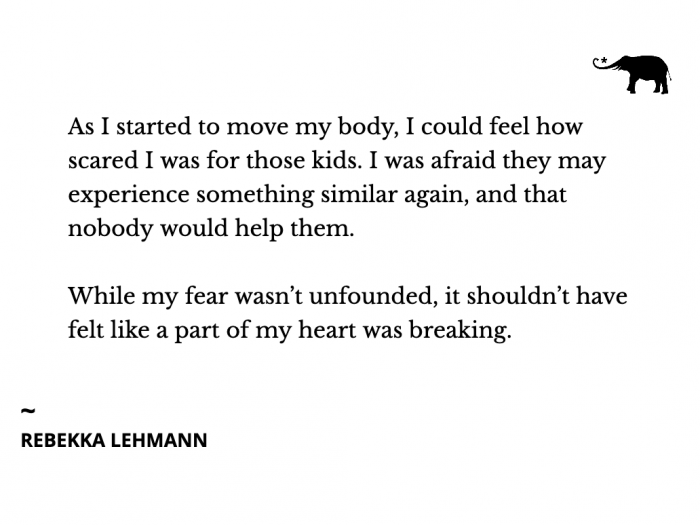View this post on Instagram
I remember the moment I realized that I felt too much.
It was a Tuesday morning in the early summer of 2018. My colleague and I were just coming back from a meeting with childcare services. It was decided that two of the kids we were taking care of were going to be sent back into the same family system that they had been taken out of in the past.
I was sitting in our blue company van when my colleague asked me if I wanted to walk back the rest of the way as we stopped at a traffic light. She had noticed that I was struggling and needed a moment to gather myself. I nodded.
As soon as I got out, tears started running down my face. As I started to move my body, I could feel how scared I was for those kids. I was afraid they may experience something similar again, and that nobody would help them.
While my fear wasn’t unfounded, it shouldn’t have felt like a part of my heart was breaking.
Shortly after this event, I came across some eye-opening research.
For an experiment in the field of neuroscience, Matthieu Ricard, a Buddhist monk, was asked to imagine people affected by great suffering. While in an fMRI machine, researchers watched his brain in action, following the changes of activity in real time.
What they found was astounding:
Instead of observing what they usually did when people are empathic toward someone else’s suffering, Ricard’s brain showed something else.
Instead of activating the brain network linked to distress and negative emotions, Ricard activated areas associated with positive emotions.
That’s because he had meditated on compassion.
Compassion makes us focus on relieving suffering and helping those who are challenged. It’s associated with a warm, positive state that encourages strong prosocial motivation. When we’re empathic, on the other hand, we over-identify with the suffering of the other, leading to distress and negative emotions in ourselves. Our experience acts as a mirror to theirs.
This means that it may be better for us to be compassionate rather than emphatic toward our loved ones and those we care for, as it could protect us from negative consequences for our own well-being.
Other research results support this idea: just one day of compassion training in non-expert meditators through loving-kindness meditation already increased self-reports of positive affect, even in response to the hardship of others.
What’s more, according to Ricard, compassion has an immense potential to act as an antidote to empathic suffering and burnout.
Immersing ourselves in a state of empathy and sharing pain can quickly become unbearable and lead to emotional exhaustion. Instead of compassion fatigue, the real issue may be “empathy fatigue.”
If you feel like this approach may be of benefit for you, join me in practicing this loving-kindness meditation:
Sit comfortably with your spine straight. Relax your shoulders. Now, take some deep inhales through your nose and exhales through your nose or mouth.
When you feel like you’ve arrived in the present moment, recall a situation when you felt especially critical toward yourself.
Then repeat quietly in your mind or out loud:
May I be free from all pain and suffering.
May I be healthy.
May I be happy.
May I be at peace.
Now, imagine someone in your life you love and appreciate very much. Tell them quietly in your mind or say out loud:
May you be free from all pain and suffering.
May you be healthy.
May you be happy.
May you be at peace.
Next, bring to mind an acquaintance—someone you don’t know very well and feel neutral about. Tell them quietly in your mind or say out loud:
May you be free from all pain and suffering.
May you be healthy.
May you be happy.
May you be at peace.
Now, focus your attention on a person you disagree with or dislike. Remember that, just like you, they wish to live in peace.
Tell them quietly in your mind or say out loud:
May you be free from all pain and suffering.
May you be healthy.
May you be happy.
May you be at peace.
Lastly, expand your awareness to all living beings. Yourself, those you love and appreciate, those you feel neutral about, those you dislike, and everyone else.
May we all be free from pain and suffering.
May we all be healthy.
May we all be happy.
May we all be at peace.
Take a couple of deep inhales and breathe out through your nose or mouth.
Notice how you feel.
Thank yourself for taking this time out of your day to practice compassion toward yourself and others. Then bring your attention back to the room you’re in.
Let me know in the comments how this practice went for you, and feel free to share it with others you think may benefit from it.

 Share on bsky
Share on bsky







Read 18 comments and reply